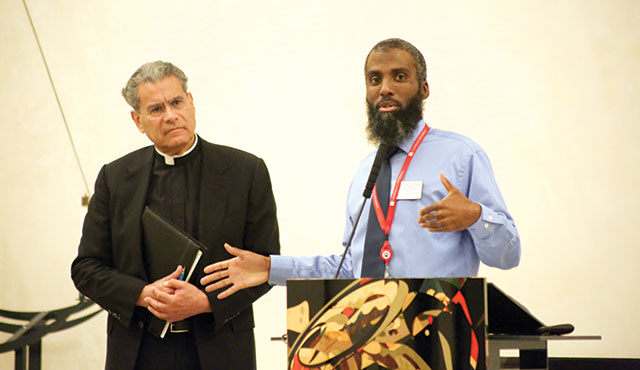It’s a pretty popular aphorism today that people are a lot more alike than they are different.
Prof. Scott Alexander of the Catholic Theological Union in Chicago calls it the “sameness thesis.” And he’s not buying it.
“I believe we are as different as we are alike,” Alexander told a gathering at Chapman University during a November meeting of Catholic and Muslim students.
In a speech entitled “Muslims, Catholics, and the Gift of Difference,” Alexander stressed that differences were created and are ordained by God, and as such are “a gift.”
While he says the notion of alikeness may come from a well-meaning place in “valorizing community over difference,” he says it overlooks an important idea: that difference is not a bad thing.
Alexander says if God had wanted us to be alike, sound alike, look alike and think alike, he would have created us that way. Instead, mankind has evolved into a wide diversity of color, language and beliefs.
“People are afraid of differences. They are downplayed and avoided,” Alexander said.
Alexander was the speaker at the inaugural “Muslim, Catholic Scholar Night,” at Chapman, an event organized by student groups.
Fr. Rafael Luevano, the Catholic Chaplain and an associate professor at the university, said students from the Newman Catholic Fellowship at Chapman and the Muslim Students Association had been working toward the scholar night since they began meeting about two years ago for periodic meals and social interactions.
This year, however, they took it up to a notch, with dinner, the guest speaker and what was called a Muslim-Catholic Dialogue.
About 50 students and a number of local religious leaders gathered to celebrate diversity. Coincidentally, while the meeting was held, in a nearby courtyard another cultural celebration was underway as a group of mostly Latino students recognized Dia de los Muertes, or Day of the Dead, a three-day commemoration of the spirits of friends and family who have died.
“It is central to Catholicism to dialogue between various faiths,” Luevano said of the inter-religious discussion held at the Fish Interfaith Center.
Given the perilous relationships between Christians and Muslims, Luevano believes it is more important than ever to meet and talk.
“This should be happening on every campus,” said Luevano. ‘We’re looking for common ground to respond to a tense, fractured world.”
Luevano has been reaching across the aisles of faith for 20 years to embrace the Muslim community and engage in dialogue. He said the effort became a particular focus for him in the wake of the terrorist attacks of Sept. 11, 2001.
“This is a beautiful thing to be a part of,” Luevano said.
Bryleigh Blaise, a junior at Chapman and president of the Newman Catholic Fellowship at Chapman said it has been fun and rewarding to share meals with the Muslim students and talk about their experiences and faith.
She began attending the meetings in her freshman years and was excited to hear from Dr. Alexander, a professor of Islamic studies.
“This was natural,” she said of the evolution from the formerly casual gatherings to a formal, academic experience. She added that she hoped it would build on the relationships that have been formed over the past two years.
Shaykh Jibreel Speight, the school’s new and first director of Muslim life, said while the meals and less-formal gatherings were important and will continue, “we want to take it to another level.”
In his way Speight is emblematic of the idea of embracing differences. Although it is not a Christian college, Chapman was founded by the Disciples of Christ as Hesperian College in Woodland in 1860 and remains connected with that church as well as the United Church of Christ.
Speight was hired in September, partly as a recognition of the growing Islamic population in the school.
“Chapman recognized that we have a large Muslim community. It would be wise for someone here to work with them and be a guide to them and others into how to practice Islam,” Speight said, when he was hired.
Alexander said in modern U.S. society, “Muslims are demonized and marginalized.”
He feels it’s always important for the “dominant culture to understand what it’s like on the other side of the equation.”
Because of our differences, people have the “capacity to be radically different,” but Alexander said, “I don’t think that’s a problem.”
According to Alexander, “We erect homogeneity as false idols.”
However, such thinking often constricts thinking. Instead, he argues it is important to expand our experience to consider and try to understand different ways of thinking, interacting and worshipping.
When that happens, Alexander argues, “we move closer to God-consciousness.”
Speight said he hoped the students would not only continue with the meals and meetings, but take the experiences further.
Speight said it was important not only to embrace diversity, but to find common purpose.
“It’s cool to be different. It’s even better to work together.”

